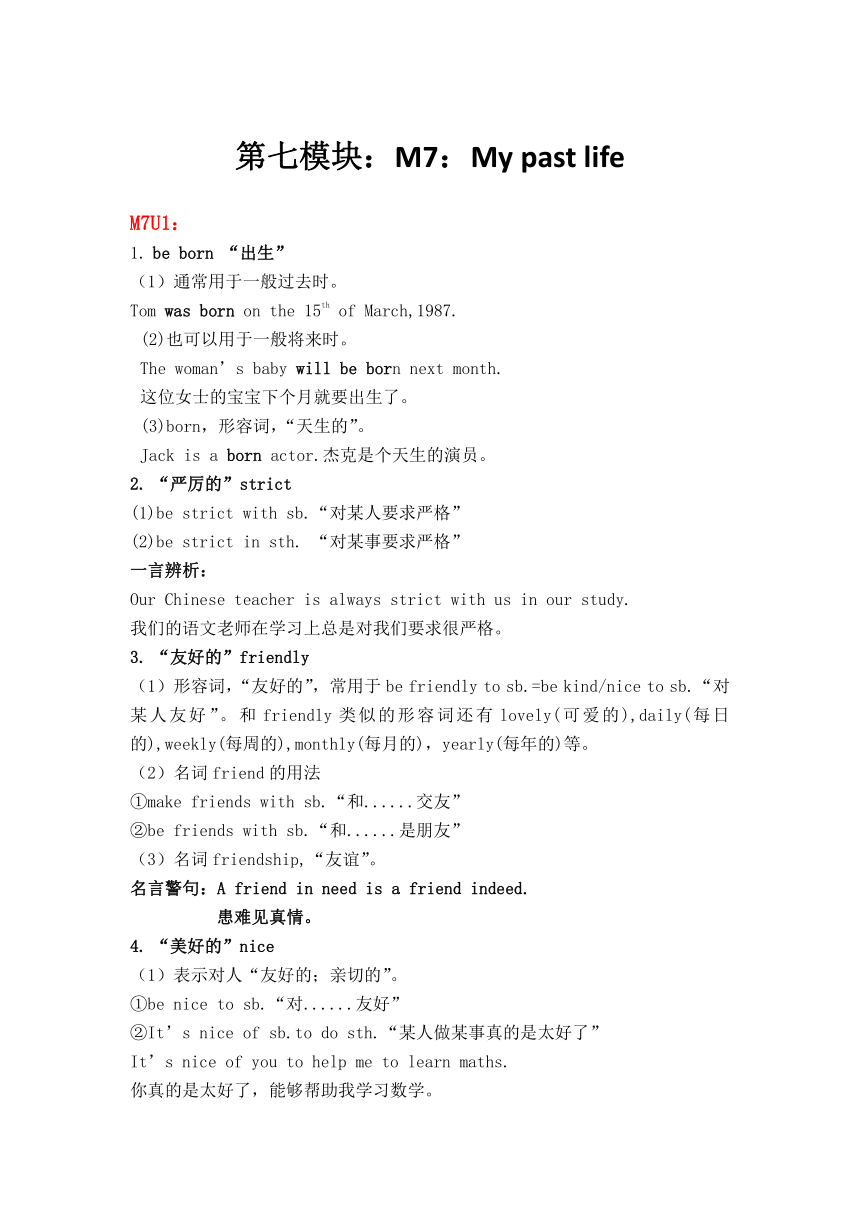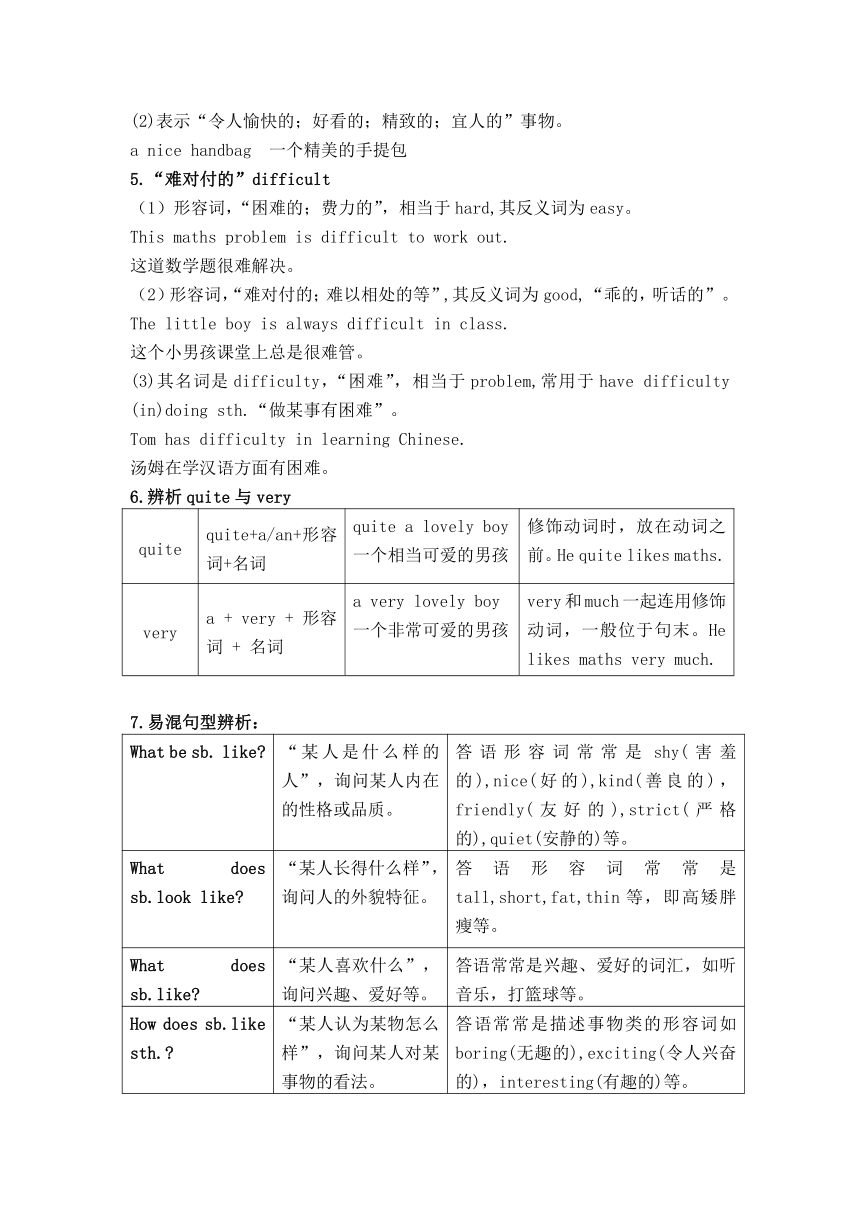外研版英语七下第七模块Module 7 My past life重要知识点
文档属性
| 名称 | 外研版英语七下第七模块Module 7 My past life重要知识点 |

|
|
| 格式 | zip | ||
| 文件大小 | 39.5KB | ||
| 资源类型 | 教案 | ||
| 版本资源 | 外研版 | ||
| 科目 | 英语 | ||
| 更新时间 | 2020-05-23 00:00:00 | ||
图片预览


文档简介
第七模块:M7:My past life
M7U1:
be born “出生”
(1)通常用于一般过去时。
Tom was born on the 15th of March,1987.
(2)也可以用于一般将来时。
The woman’s baby will be born next month.
这位女士的宝宝下个月就要出生了。
(3)born,形容词,“天生的”。
Jack is a born actor.杰克是个天生的演员。
“严厉的”strict
(1)be strict with sb.“对某人要求严格”
(2)be strict in sth. “对某事要求严格”
一言辨析:
Our Chinese teacher is always strict with us in our study.
我们的语文老师在学习上总是对我们要求很严格。
“友好的”friendly
(1)形容词,“友好的”,常用于be friendly to sb.=be kind/nice to sb.“对某人友好”。和friendly类似的形容词还有lovely(可爱的),daily(每日的),weekly(每周的),monthly(每月的),yearly(每年的)等。
(2)名词friend的用法
①make friends with sb.“和......交友”
②be friends with sb.“和......是朋友”
(3)名词friendship,“友谊”。
名言警句:A friend in need is a friend indeed.
患难见真情。
“美好的”nice
表示对人“友好的;亲切的”。
①be nice to sb.“对......友好”
②It’s nice of sb.to do sth.“某人做某事真的是太好了”
It’s nice of you to help me to learn maths.
你真的是太好了,能够帮助我学习数学。
(2)表示“令人愉快的;好看的;精致的;宜人的”事物。
a nice handbag 一个精美的手提包
5.“难对付的”difficult
(1)形容词,“困难的;费力的”,相当于hard,其反义词为easy。
This maths problem is difficult to work out.
这道数学题很难解决。
(2)形容词,“难对付的;难以相处的等”,其反义词为good,“乖的,听话的”。
The little boy is always difficult in class.
这个小男孩课堂上总是很难管。
(3)其名词是difficulty,“困难”,相当于problem,常用于have difficulty (in)doing sth.“做某事有困难”。
Tom has difficulty in learning Chinese.
汤姆在学汉语方面有困难。
6.辨析quite与very
quite quite+a/an+形容词+名词 quite a lovely boy一个相当可爱的男孩 修饰动词时,放在动词之前。He quite likes maths.
very a + very + 形容词 + 名词 a very lovely boy一个非常可爱的男孩 very和much一起连用修饰动词,一般位于句末。He likes maths very much.
7.易混句型辨析:
What be sb. like? “某人是什么样的人”,询问某人内在的性格或品质。 答语形容词常常是shy(害羞的),nice(好的),kind(善良的),friendly(友好的),strict(严格的),quiet(安静的)等。
What does sb.look like? “某人长得什么样”,询问人的外貌特征。 答语形容词常常是tall,short,fat,thin等,即高矮胖瘦等。
What does sb.like? “某人喜欢什么”,询问兴趣、爱好等。 答语常常是兴趣、爱好的词汇,如听音乐,打篮球等。
How does sb.like sth.? “某人认为某物怎么样”,询问某人对某事物的看法。 答语常常是描述事物类的形容词如boring(无趣的),exciting(令人兴奋的),interesting(有趣的)等。
M7U2:
1.be/get bored with sb./sth.“对某人/某物感到厌烦”,bored 也可以用于feel,become等连系动词之后,常用来修饰人,指人的感受。
boring adj.修饰物,a boring job一份无聊/趣的工作
2.“一词多义”的president
(1)名词,“总统”。two presidents两位总统 President of the South Africa南非总统,指职务或称谓时首字母要大写。(2)名词,“会长;(银行)行长;院长等”。
the president of the ABC(Agricultural Bank of China“中国农业银行”)那家中国农业银行的行长。
3.bedroom是由“bed+room”构成的合成词,类似词汇还有:
classroom教室,bathroom浴室等。
注意和living room客厅,reading room阅览室,dining room餐厅等在拼写方面的区别。
4.【年年有“鱼”】的fish
(1)名词,“鱼”,可数,指数目,two fish两条鱼 ,单数复数形式相同,即“单复数同形”。
(2)名词,“鱼”,可数,指种类,two kinds of fishes,两种鱼,其复数形式是fishes。
(3)名词,“鱼肉”,不可数。
I like eating fish.我喜欢吃鱼肉。
(4)动词,“钓鱼;捕鱼”。
Many people like fishing now.现在很多人喜欢垂钓。
(5)一言辨异:
Give a man a fish and he will eat for a day. Teach a man to fish and he will eat for the rest of his life.
授人以鱼,可食一日;授人以渔,可食一世。
It+be+形容词+(for/of sb.)to do sth.“(对某人来说/某人是......的)做某事是......的”,it作形式主语,后面的动词不定式是句子的真正主语。究竟介词是用for还是of,关键看形容词是描述事物还是描述人的性格,品格。
(1)It’s important for me to learn maths well.
把数学学好对我来说很重要。形容词important是来描述学好数学这件事的,故介词用for。
(2)It’s kindof you to help me with my maths.
你帮助我学数学,你真的是太好了。形容词kind是来描述“you”的优良品格的,助人为乐的你很善良、人很好,故用介词of。
6.comfortable“舒服的”,其反义词是uncomfortable“不舒服的”,其名词、动词都是comfort,“舒适;安慰;抚慰;宽慰等”。
7.on the east coast (of...)在......的东海岸
8.look forward to (doing) sth.盼望,期待(做)某事,其中to是介词,后接名词,代词宾格,动词ing形式。
I’m looking forward to hearing from you.
我正期待着收到你的来信。
9.“最后的”last
形容词,“最后的”,与first对应,the last bus最后一班公交车,for the last time最后一次
形容词,“最近过去的”,last week上周。
副词,“最近;上次”。
When did you last meet Tom?你最后一次见汤姆是什么时候?
(4)动词,“持续;延续”。
The meeting lasted for about 3 hours.
这场会议持续了大约三个小时。
(5)名词,“最后的人/物”。at last最后
He was the first to arrive and the last to leave.
他到得最早,走得最晚。
了解第10和第11条即可:
10.Two presidents of the US,John Adams and his son John, were born in Quincy.
John Adams and his son John Quincy Adams作Two presidents of the US的同位语,补充说明这两任总统都是谁。
11....a big living room with a TV, a kitchen,...
其中with a TV, a kitchen,...,with介词短语作后置定语,修饰前面的名词room。
M7U3:
1.以字母o结尾的名词复数形式变化。
(1)部分以字母o结尾的名词复数形式,是在其末尾+es。
常见词如下:
Negro(es) hero(es) (like eating) tomato(es) & potato(es)
记忆口诀:黑人英雄(喜欢吃)西红柿和土豆。(“两人两菜”)
(2)其余以字母o结尾表示无生命事物的名词复数形式,往往直接在其末尾+s。
如:photo(s), radio(s), piano(s)等。
2.在英语中,年月日的表达通常有两种方式,即“月+日+年”或“日+月+年”。
如July 18th, 1918 = 18th July,1918,而汉语则为年月日,即1918年7月18日
There was a new film on yesterday...
昨天有一部新电影上映......
be on “(节目等)上映;上演;展出;进行;(电器等)开着”,其中on为副词,“在上演;进行中”。
The little girl always sleeps with the light on.
那个小女孩总是开着灯睡觉。
from...to...“从......到”,连接时间和地点时,很多情况下可以和between...and...互换。
Tom studied in this middle school from 2009 to 2012.
=Tom studied in this middle school between 2009 and 2012.
汤姆从2009至2012年在这所中学上学。
注意:
强调“从始至终”,只能用from...to...;强调空间位置时,只能用between...and。
M7U1:
be born “出生”
(1)通常用于一般过去时。
Tom was born on the 15th of March,1987.
(2)也可以用于一般将来时。
The woman’s baby will be born next month.
这位女士的宝宝下个月就要出生了。
(3)born,形容词,“天生的”。
Jack is a born actor.杰克是个天生的演员。
“严厉的”strict
(1)be strict with sb.“对某人要求严格”
(2)be strict in sth. “对某事要求严格”
一言辨析:
Our Chinese teacher is always strict with us in our study.
我们的语文老师在学习上总是对我们要求很严格。
“友好的”friendly
(1)形容词,“友好的”,常用于be friendly to sb.=be kind/nice to sb.“对某人友好”。和friendly类似的形容词还有lovely(可爱的),daily(每日的),weekly(每周的),monthly(每月的),yearly(每年的)等。
(2)名词friend的用法
①make friends with sb.“和......交友”
②be friends with sb.“和......是朋友”
(3)名词friendship,“友谊”。
名言警句:A friend in need is a friend indeed.
患难见真情。
“美好的”nice
表示对人“友好的;亲切的”。
①be nice to sb.“对......友好”
②It’s nice of sb.to do sth.“某人做某事真的是太好了”
It’s nice of you to help me to learn maths.
你真的是太好了,能够帮助我学习数学。
(2)表示“令人愉快的;好看的;精致的;宜人的”事物。
a nice handbag 一个精美的手提包
5.“难对付的”difficult
(1)形容词,“困难的;费力的”,相当于hard,其反义词为easy。
This maths problem is difficult to work out.
这道数学题很难解决。
(2)形容词,“难对付的;难以相处的等”,其反义词为good,“乖的,听话的”。
The little boy is always difficult in class.
这个小男孩课堂上总是很难管。
(3)其名词是difficulty,“困难”,相当于problem,常用于have difficulty (in)doing sth.“做某事有困难”。
Tom has difficulty in learning Chinese.
汤姆在学汉语方面有困难。
6.辨析quite与very
quite quite+a/an+形容词+名词 quite a lovely boy一个相当可爱的男孩 修饰动词时,放在动词之前。He quite likes maths.
very a + very + 形容词 + 名词 a very lovely boy一个非常可爱的男孩 very和much一起连用修饰动词,一般位于句末。He likes maths very much.
7.易混句型辨析:
What be sb. like? “某人是什么样的人”,询问某人内在的性格或品质。 答语形容词常常是shy(害羞的),nice(好的),kind(善良的),friendly(友好的),strict(严格的),quiet(安静的)等。
What does sb.look like? “某人长得什么样”,询问人的外貌特征。 答语形容词常常是tall,short,fat,thin等,即高矮胖瘦等。
What does sb.like? “某人喜欢什么”,询问兴趣、爱好等。 答语常常是兴趣、爱好的词汇,如听音乐,打篮球等。
How does sb.like sth.? “某人认为某物怎么样”,询问某人对某事物的看法。 答语常常是描述事物类的形容词如boring(无趣的),exciting(令人兴奋的),interesting(有趣的)等。
M7U2:
1.be/get bored with sb./sth.“对某人/某物感到厌烦”,bored 也可以用于feel,become等连系动词之后,常用来修饰人,指人的感受。
boring adj.修饰物,a boring job一份无聊/趣的工作
2.“一词多义”的president
(1)名词,“总统”。two presidents两位总统 President of the South Africa南非总统,指职务或称谓时首字母要大写。(2)名词,“会长;(银行)行长;院长等”。
the president of the ABC(Agricultural Bank of China“中国农业银行”)那家中国农业银行的行长。
3.bedroom是由“bed+room”构成的合成词,类似词汇还有:
classroom教室,bathroom浴室等。
注意和living room客厅,reading room阅览室,dining room餐厅等在拼写方面的区别。
4.【年年有“鱼”】的fish
(1)名词,“鱼”,可数,指数目,two fish两条鱼 ,单数复数形式相同,即“单复数同形”。
(2)名词,“鱼”,可数,指种类,two kinds of fishes,两种鱼,其复数形式是fishes。
(3)名词,“鱼肉”,不可数。
I like eating fish.我喜欢吃鱼肉。
(4)动词,“钓鱼;捕鱼”。
Many people like fishing now.现在很多人喜欢垂钓。
(5)一言辨异:
Give a man a fish and he will eat for a day. Teach a man to fish and he will eat for the rest of his life.
授人以鱼,可食一日;授人以渔,可食一世。
It+be+形容词+(for/of sb.)to do sth.“(对某人来说/某人是......的)做某事是......的”,it作形式主语,后面的动词不定式是句子的真正主语。究竟介词是用for还是of,关键看形容词是描述事物还是描述人的性格,品格。
(1)It’s important for me to learn maths well.
把数学学好对我来说很重要。形容词important是来描述学好数学这件事的,故介词用for。
(2)It’s kindof you to help me with my maths.
你帮助我学数学,你真的是太好了。形容词kind是来描述“you”的优良品格的,助人为乐的你很善良、人很好,故用介词of。
6.comfortable“舒服的”,其反义词是uncomfortable“不舒服的”,其名词、动词都是comfort,“舒适;安慰;抚慰;宽慰等”。
7.on the east coast (of...)在......的东海岸
8.look forward to (doing) sth.盼望,期待(做)某事,其中to是介词,后接名词,代词宾格,动词ing形式。
I’m looking forward to hearing from you.
我正期待着收到你的来信。
9.“最后的”last
形容词,“最后的”,与first对应,the last bus最后一班公交车,for the last time最后一次
形容词,“最近过去的”,last week上周。
副词,“最近;上次”。
When did you last meet Tom?你最后一次见汤姆是什么时候?
(4)动词,“持续;延续”。
The meeting lasted for about 3 hours.
这场会议持续了大约三个小时。
(5)名词,“最后的人/物”。at last最后
He was the first to arrive and the last to leave.
他到得最早,走得最晚。
了解第10和第11条即可:
10.Two presidents of the US,John Adams and his son John, were born in Quincy.
John Adams and his son John Quincy Adams作Two presidents of the US的同位语,补充说明这两任总统都是谁。
11....a big living room with a TV, a kitchen,...
其中with a TV, a kitchen,...,with介词短语作后置定语,修饰前面的名词room。
M7U3:
1.以字母o结尾的名词复数形式变化。
(1)部分以字母o结尾的名词复数形式,是在其末尾+es。
常见词如下:
Negro(es) hero(es) (like eating) tomato(es) & potato(es)
记忆口诀:黑人英雄(喜欢吃)西红柿和土豆。(“两人两菜”)
(2)其余以字母o结尾表示无生命事物的名词复数形式,往往直接在其末尾+s。
如:photo(s), radio(s), piano(s)等。
2.在英语中,年月日的表达通常有两种方式,即“月+日+年”或“日+月+年”。
如July 18th, 1918 = 18th July,1918,而汉语则为年月日,即1918年7月18日
There was a new film on yesterday...
昨天有一部新电影上映......
be on “(节目等)上映;上演;展出;进行;(电器等)开着”,其中on为副词,“在上演;进行中”。
The little girl always sleeps with the light on.
那个小女孩总是开着灯睡觉。
from...to...“从......到”,连接时间和地点时,很多情况下可以和between...and...互换。
Tom studied in this middle school from 2009 to 2012.
=Tom studied in this middle school between 2009 and 2012.
汤姆从2009至2012年在这所中学上学。
注意:
强调“从始至终”,只能用from...to...;强调空间位置时,只能用between...and。
同课章节目录
- Module 1 Lost and found
- Unit 1 Whose bag is this?
- Unit 2 Are they yours?
- Unit 3 Language in use
- Module 2 What can you do ?
- Unit 1 I can play the piano
- Unit 2 I can run really fast
- Unit 3 Language in use
- Module 3 Making plans
- Unit 1 What are you going to do at the weekends?
- Unit 2 We're going to cheer the players.
- Unit 3 Language in use
- Module 4 Life in the future
- Unit 1 Everyone will study at home
- Unit 2 Every family will have a small plane.
- Unit 3 Language in use
- Module 5 Shopping
- Unit 1 What can I do for you?
- Unit 2 You can buy everything on the Internet
- Unit 3 Language in use
- Module 6 Around town
- Unit 1 Could you tell me how to get to the Nationa
- Unit 2 The London Eye is on your right.
- Unit 3 Language in use
- Revision module A
- Module 7 My past life
- Unit 1 I was born in a small village.
- Unit 2 I was born in Quincy.
- Unit 3 Language in use
- Module 8 Story time
- Unit 1 Once upon a time….
- Unit 2 Goldilocks hurried out of the house.
- Unit 3 Language in use
- Module 9 Life history
- Unit 1 He left school and began work at the age of
- Unit 2 He decided to be an actor.
- Unit 3 Language in use
- Module 10 A holiday journey
- Unit 1 What did you do?
- Unit 2 This morning we took a walk.
- Unit 3 Language in use
- Module 11 Body language
- Unit 1 They touch noses!
- Unit 2 Here are some ways to welcome them.
- Unit 3 Language in use
- Module 12 Western music
- Unit 1 It's so beautiful!
- Unit 2 Vienna is the centre of European classical
- Unit 3 Language in use
- Revision module B
